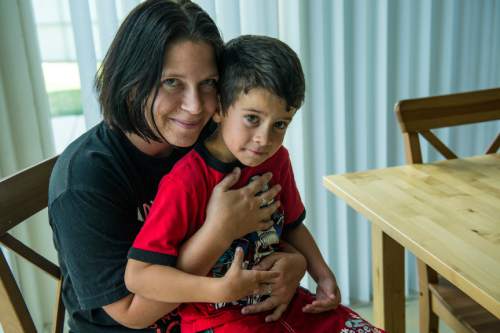This is an archived article that was published on sltrib.com in 2016, and information in the article may be outdated. It is provided only for personal research purposes and may not be reprinted.
It took us a long time to realize that it is unrealistic, if not cruel, to expect a homeless person to solve all his emotional, substance abuse, legal, education, financial and whatever other issues may have brought him down before providing him with a roof over his head.
It is foolish to think that any homeless person can get cleaned up, employed and independent without a safe home base, without an address to put on a resume or a disability claim.
But it is also increasingly clear that just handing over a few month's rent won't solve the problem, either.
That's why a program found — if you look real hard — in Midvale, one called LifeStart Village, has been so successful.
Rather than just offer counseling to the still homeless, or a key to an apartment followed by a hardy fare thee well, LifeStart and its parent organization, the nonprofit Family Support Center, provides shelter as it leads a homeless person, or family, through a series of steps designed to move them from desperation through dependency to self-sufficiency.
The program claims a success rate of nearly 90 percent. But it may lose its federal funding because the government is looking to shift its support to another approach, a one-and-done method called "rapid rehousing."
That would be a mistake.
Utah officials have found that often — especially with single men, many of them veterans — rapid rehousing works well enough that our community was briefly held up as the Place That Had Solved Homelessness.
But in many other cases it turns out that just spotting someone three month's rent won't keep a person, or a family, housed if illness, arrest, addiction or unemployment leaves them unable to come up with the money to remain in the residence after the fourth month.
Clearly, a more holistic approach is needed. That's why Salt Lake County Mayor Ben McAdams calls his new approach to reducing homelessness "collective impact."
Housing, whether it is an apartment, a shelter or a village, won't help the homeless or the community unless it comes with ongoing support for all of those who need it, in whatever form they need it, for as long as they need it.
The threat that such support won't be there is the thing that leaves homeless families in the lurch and, as members of the Salt Lake City Council are warning, neighborhoods wary of any new projects in their backyards.
The shelter our homeless neighbors need is not just made of wood or bricks. It is provided by ongoing case management, health care and other face-to-face support. Without it, no amount of buildings and beds will really help.



